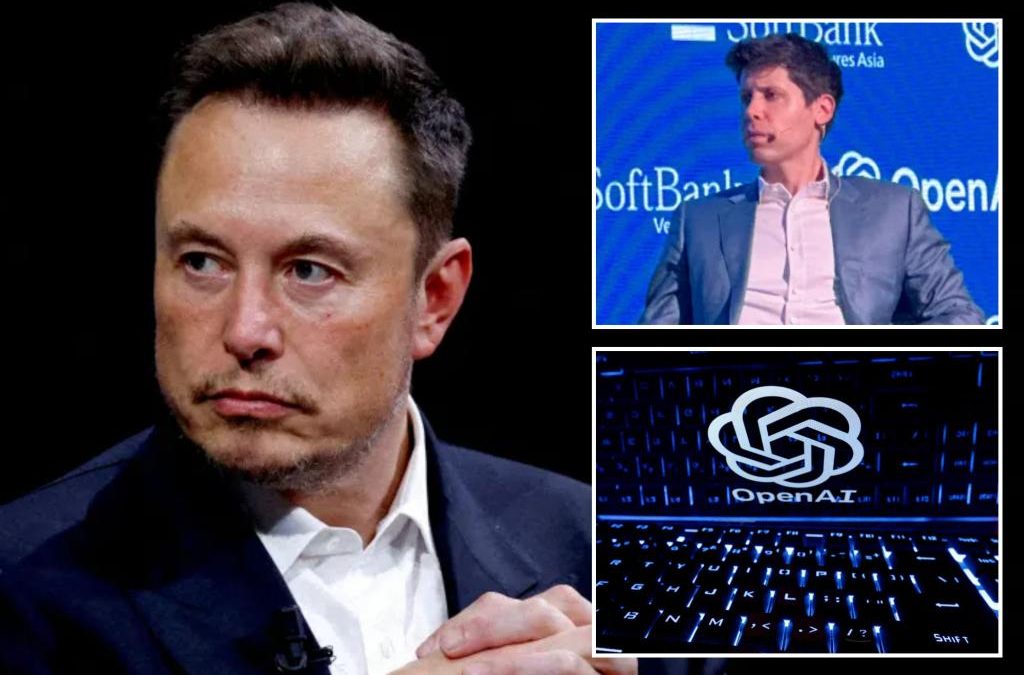OpenAI — in its first public comments since Elon Musk claimed in a lawsuit the artificial intelligence behemoth puts “profit over humanity” — claimed the tech tycoon tried to gain “full control” of the company six years ago by merging it with Tesla.
The ChatGPT-maker included the allegation in a Tuesday evening blog post, saying “We intend to move to dismiss all of Elon’s claims,” which include that Sam Altman has led the firm to “radically depart from its original mission” by prioritizing profit over humanity.
“As we discussed a for-profit structure in order to further the mission, Elon wanted us to merge with Tesla or he wanted full control,” OpenAI’s founding team and executives — including Sam Altman, Greg Brockman, Ilya Sutskever, John Schulman, Wojciech Zaremba — penned in the post.
In early February 2018, the same month Musk left OpenAI — reportedly over disagreements with the deal Altman struck with Microsoft, marking a transition away from the company’s purely nonprofit roots — he “forwarded us an email suggesting that OpenAI should ‘attach to Tesla as its cash cow,’ commenting that it was ‘exactly right,’” per OpenAI’s blog post.
“Tesla is the only path that could even hope to hold a candle to Google,” Musk reportedly added in the note.
The OpenAI band went on to expose Musk’s vow to make a $1 billion funding commitment to the company — the most valuable AI startup that’s reportedly worth $80 billion in the wake of a recent secondary stock sale.
However, “in total, the non-profit has raised less than $45M from Elon and more than $90M from other donors,” OpenAI said amid its escalating feud with Musk, who noted in his complaint filed on Feb. 29 in California’s Superior Court that OpenAI’s certificate of incorporation states that its work isn’t “organized for the private gain of any person.”
“When he left in late February 2018, he told our team he was supportive of us finding our own path to raising billions of dollars,” OpenAI claimed.
Although OpenAI is still governed by a nonprofit, it has bolstered its for-profit arm in recent years with the help of prominent investors like Microsoft, which has committed $13 billion to the company as part of a “multi-year agreement.”
As part of the deal, Microsoft received a 49% stake in the earnings of OpenAI’s for-profit arm.
Other major shareholders of OpenAI’s profitable business include LinkedIn founder Reid Hoffman and billionaire venture capitalist Vinod Khosla of Khosla Ventures.
Musk said in the court documents that he filed the case “to compel OpenAI to adhere to the Founding Agreement and return to its mission to develop AGI [artificial general intelligence] for the benefit of humanity, not to personally benefit the individual defendants and the largest technology company in the world.”
The court filing — which asks for a jury trial and a court order requiring OpenAI to continue to follow its alleged vow to benefit the public rather than Microsoft — also claims that the AI giant now seeks “to maximize profits for Microsoft, rather than for the benefit of humanity.”
OpenAI denied the allegations in its blog post, where it said “The mission of OpenAI is to ensure AGI [artificial general intelligence] benefits all of humanity, which means both building safe and beneficial AGI and helping create broadly distributed benefits.”
Most recently, OpenAI added a new software to its high-tech portfolio called Sora, which can produce a one-minute video in response to a few simple text queries.
The technology is currently available to select creators and security experts who will “red-team” the product for security issues — a process where a group pretends to be an enemy and attempts a physical or digital intrusion against an organization.
It wasn’t immediately clear when Sora will become available to the general public, or if it will be free for users upon its release.
Source




